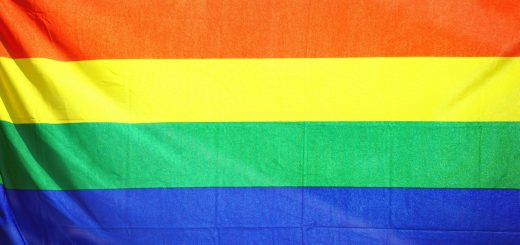Desmond Tutu - fighting for lesbian and gay rights.

For hundreds of millions of gay, lesbian, bisexual, and transgender people across the Earth, the fight for equality in the eyes of the government is an ongoing struggle with varying degrees of danger. Some countries have granted their LGBTQ population full protection under the law. The public and society at large are now accepting of not only gay marriage but also gay married couples adopting children and forming a family. Unfortunately, that is not how the entire world views gay people. Some countries have laws where any LGBTQ person must be imprisoned immediately upon discovery. Some countries sentence them to death for the crime of loving someone that is their same gender or being transgender and wanting to change their sex.
The countries accepting of the LGBTQ communities did not change their laws and view out of the goodness and kindness of the population at large. It was due to the activism of influential people. They organized protests, defend themselves when the police monitored them, and stick together while getting straight, cisgender allies to help them fight. In many countries, the fight for an equal LGBTQ community is on, and one of those countries that are improving little by little is South Africa, and that is because of the activism of Desmond Tutu.
The activism of Desmond Tutu against Apartheid
Desmond Tutu is famous, as he is an archbishop who was one of the key activists against the South African apartheid regime. The fight to end apartheid took more than 40 years, but through perseverance and strength, it all ended in 1994. The apartheid, which segregated black people and white in South Africa and Namibia. This unjust institution was upheld by law and government officials from 1948 until the 1990s. Apartheid was created to favor the minority population of white people in South Africa and gave them most of the land, political power, money, and police power. According to South Africa's apartheid regime rules, white people were the most important race, followed by Asians and other people of color. Black Africans were at the bottom.
Because of the strict racial rules of the apartheid, people of one race were not allowed to marry a person of another race. This meant that if a child was produced from an interracial sexual encounter or an interracial romance, that child was technically illegal, and if the parents of the child were caught with them, they would be placed in prison.
Desmond Tutu, along with Nelson Mandela, Walter Sisulu, and Andrew Mlangeni, would fight for decades against apartheid and achieve its destruction of the white supremacist institution in 1994.
Desmond Tutu after the destruction of apartheid
For decades, Desmond Tutu fought against the institutionalized government upheld South Africa's apartheid racial policies. Tutu went to prison for his activism, and yet he continued to speak out. Once apartheid officially ended in South Africa, he was placed on several different boards and committees to discover the true damage of certain apartheid policies and correct anything he could.
Now, the archbishop is leading the way in the fight for the rights of LGBTQ people in South Africa and surrounding countries. Although he retired in 1996, he is again using his political power and name to bring light to the struggle for LGBTQ people. Although his main focus was on apartheid, Desmond Tutu has been advocating for LGBTQ people since the 1970s. It is because of his actions, and his advocacy is the reason why the South African Constitution has an anti-discrimination clause against LGBTQ people. It is the first constitution in the world to include such a clause.
But just because the clause against LGBTQ discrimination exists does not mean that everything is equal and accepting in the culture of South Africa.
South African Culture and gay activism
In some parts of the government, gays and lesbians do have the same rights as straight people. In 2006, South Africa became the sixth country in the world to allow gay marriage, which was a milestone for the gay community and the entire continent of Africa.
In most places, the most welcoming demographic towards people in the LGBT community tends to be on the younger side. Those who are 35 years old and younger are the most likely demographic to support gay marriage, support trans people becoming their correct gender by transitioning and going through surgery, and have no problem sharing spaces with queer people. But you will see this attitude in young people if there are already a few anti-discrimination laws that protect LGBTQ people. In some countries, the young are just as discriminating as the elderly are.
The young people of South Africa are accepting of queer people, but their acceptance has a limit.
Unlike most countries that have LGBTQ acceptance, South Africa's anti-discrimination policies came before the population accepted queer people into mainstream society.
Are gay people in South Africa in danger?
Yes, unfortunately, there are many hate crimes against LGBTQ people that happen every year. Many gay people say that they will not hold hands with their same-sex partners while they're walking out on the streets. Some gay people in certain parts of South Africa fear that they will be beaten while walking to school or work. Lesbians, in particular, are vulnerable. Rapists target them to perform corrective rape on them. These rapists believe that if a lesbian has sex with a man, she will realize that she is not a lesbian and will want to have sex with men exclusively. It is a horrible practice, but what is even more horrible is that police sometimes look the other way when it happens, so the women have no one to turn to.
Even if a man is not a rapist, they will still try to convince lesbians that having sex with a man will change their minds. This attitude is echoed by a queer woman's family members, co-workers, and friends. One woman who attended university in 2015 told the BBC that whenever she tells a man that she is a lesbian, they will immediately try to have sex with her to be her first.
Whether a woman is a lesbian or not, rape is one of the biggest issues in South Africa. The issue is so bad that South Africa has earned itself the ugly title of Rape Capital of the World.
Some organizations have formed in an effort to pressure the police and make them do their jobs when it comes to crimes against queer people. These organizations state that if the police know a crime has happened against the queer person, they will not work as hard as if the crime was against a straight person. In some cases, A case will be ignored, or you'll be thrown out. The gay person whom the hate crime is committed against will never find justice, and the perpetrator will walk free to do it again.
Another issue is how the media report crimes that occur against gay people. If a white lesbian is raped, she will receive much more sympathy from the media and the judicial system than if a black lesbian was raped.
Where can LGBTQ people meet?
Organizations and alliances have formed across South Africa to protect queer people from discrimination and create a network of support and understanding. They can also quickly gather together when something has happened, and there needs to be a protest. While policing the police to ensure that they do their job is one responsibility that they take on, another responsibility is Providing a safe shelter for anyone who can no longer live in their own home. If a gay person is born into a homophobic family, they might throw that child out onto the streets. So creating centers where gay people can take shelter is a priority.
Homophobic attitudes are not as prevalent in certain areas, and it is in these towns and cities where gay people are actually treated as equals. The larger cities are much more accepting of gay people than smaller towns and the countryside. This shows that as people are exposed to two gay people on a daily basis, the more comfortable they are with them.
Religion and gay people in South Africa
South Africa is an extremely religious country, and most of the country is Christian. While Desmond Tutu is an Archbishop who happily welcomes LGBTQ people into his conversation, most other religious authorities are not so either to have such people in their churches. In the countryside and in small towns, gay people must keep their sexual orientation to themselves if they wish to enter a religious building like a church.
If gay people who are open and out want to serve in the church or become members, some churches are creating alternative services that they can go to so they don't make the straight congregation uncomfortable. While separation is not an ideal situation, at least gay people are allowed to worship and attend church.
So how is Desmond Tutu helping the LGBTQ community in South Africa?
For starters, Desmond Tutu has a daughter, and she is a lesbian. His daughter is treated differently from straight women in South Africa does not sit well with him. He's fighting for the rights of his daughter as well as over 400,000 other LGBTQ people in the country. Following in her father's footsteps, Tutu van Furth is vocal about the struggle of being a lesbian in South Africa. In December 2015, she was forced by the religious institution in South Africa to leave her post as a priest after getting married to her longtime female partner.
In 2013, Desmond Tutu wrapped the religious world by stating to a reporter that he would never follow a homophobic God. When you think about all of the debates that happened in the last ten years around the Christian church and its acceptance of LGBTQ people, you can see how shocking this statement is. But Desmond Tutu says that he has never seen a reason why God would not love any member of the LGBTQ community. Using his conviction as an Archbishop, tutu says that God would never reject a gay person as all people are his children, and no characteristic like sexual orientation or race will ever change that.
How can South Africa become more accepting?
The biggest hurdle to the open acceptance of LGBTQ people in South Africa is education. Much of the country still needs to be properly educated about gays, lesbians, and transgender people. There are many myths and lies that still influence the way South African people see the LGBTQ community. If the government wants to make South Africa in the first place, they will need widespread comprehensive education in schools and media. Education and combating falsehoods will take a very long time, but it is the most effective and comprehensive way of changing the homophobic attitudes of South Africa.
There must also be more protection for LGBTQ kids in school so their straight peers do not bully them. Bullying can cause victims to become depressed and drop out of school. Missing out on their education will impact the student as they grow into an adult. But protecting queer kids from homophobes and bullies will help them in the long run.
Conclusion
At 89 years old, most men and women would take a step back and live out their golden years happy and at peace. But this is not what Desmond Tutu has decided to do. He is using his golden years to fight for the rights of gay people in South Africa. He is truly a remarkable activist who does not stay silent when injustice rules over a community or a country. When he finally passes away, his children will take up the mantle and fight in favor of the many messages that their father dedicated his life to. As long as there are advocates and activists working to improve the lives of the LGBTQ people in South Africa, progress will come.























